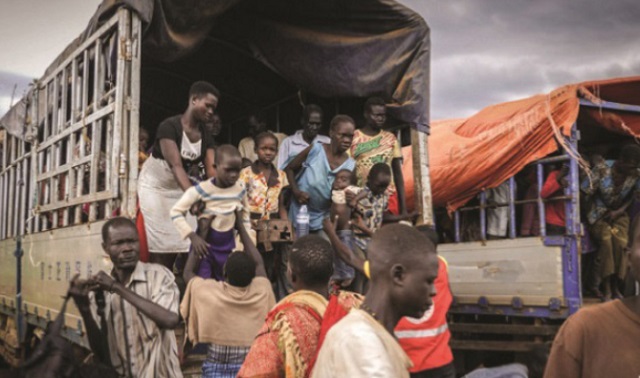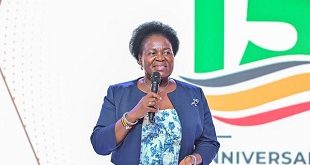
Head of Global Communications says UNHCR does not even have sufficient funds to provide enough soap
| THE INDEPENDENT | The UN Refugee Agency, UNHCR, is calling for urgent support and responsibility-sharing from the international community to preserve and reinforce Uganda’s model refugee policy of social inclusion and integration, amid surging needs, drastic funding cuts to global humanitarian programmes and fresh displacement into the country.
Joung-ah Ghedini-Williams, UNHCR’s Head of Global Communications on Dec.02 in a brief to journalists at the Palais des Nations in Geneva, said during a visit to Uganda between 21 and 26 November he noted that services and systems in refugee settlements are bursting at the seams.
“I was struck by how these settlements have become indistinguishable from host communities,” he said, “Refugee children attend school alongside Ugandan children, health facilities serve both refugee and host communities, and several district-level water services have been transitioned to national systems”.
He said he visited the Kyaka II and Rwamwanja refugee settlements in Kyegegwa and Kamwenge districts in the country’s Western Region and noted that the refugee and Ugandan communities are working towards self-sufficiency.
This year, 130,000 refugees from the Democratic Republic of the Congo (DRC) and South Sudan have fled continuing violence to find safety Uganda, putting further pressure on an overstretched humanitarian response. Uganda was already hosting over 1.5 million refugees at the start of 2022, making it one of the most important refugee host countries in the world and the largest on the African continent.
At the Bujubuli Health Center in Kyaka II, I Ghedini-Williams says he met health practitioners seeing up to 80 patients a day with facilities so full that some patients were sleeping on the floor. The pediatric center was teeming with sick children suffering from treatable ailments.
“It is particularly striking that during an outbreak of the deadly Ebola virus, UNHCR does not even have sufficient funds to provide enough soap to refugee families or to fully equip health centres to provide basic services,” he told journalists.
He said schools are trying to function beyond their capacity. At the Rwamwanja Primary School, Ugandan and Congolese teachers work in double shifts to teach and support nearly 4,000 students from refugee and host communities. While the state standard is 50 learners to each educator, at Rwamwanja Primary there is an average of 200 students per class. There are not enough bathrooms, desks, books or even classrooms – with some students learning under leaky plastic tents.

He said as poverty has risen, so too have the risks of gender-based violence, such as child marriage and intimate partner abuse.
“I heard first-hand from both GBV activists and survivors of abuse how interlinked violence is with the availability of humanitarian assistance and cash. This situation is especially relevant as the world marks 16 Days of Activism against gender-based violence,” he said.
There are signs of hope and progress despite all these challenges, he said. At Rwamwanja, I met a rice cooperative of 242 members made up of Ugandan and Congolese farmers, half women and half men.
“They worked side by side and created a viable business model that was impressive and ambitious. By pooling their plots, seeds, capacity and crops, they were building a steady market and demand for their rice. By investing and sharing four tons of seeds, they project they will harvest 276 tons of rice by the end of January,” he said.
These significant gains in refugee self-reliance and economic inclusion must be reinforced through sustainable support from the international community, including funding for humanitarian organisations such as UNHCR.
Globally, funding shortfalls have forced UNHCR to introduce cuts to its lifesaving aid to refugees and forcibly displaced people in a number of operations across the world. Uganda is one of UNHCR’s most underfunded operations, with just 46 per cent of US$ 343.4 million received for 2022.
****
 The Independent Uganda: You get the Truth we Pay the Price
The Independent Uganda: You get the Truth we Pay the Price



